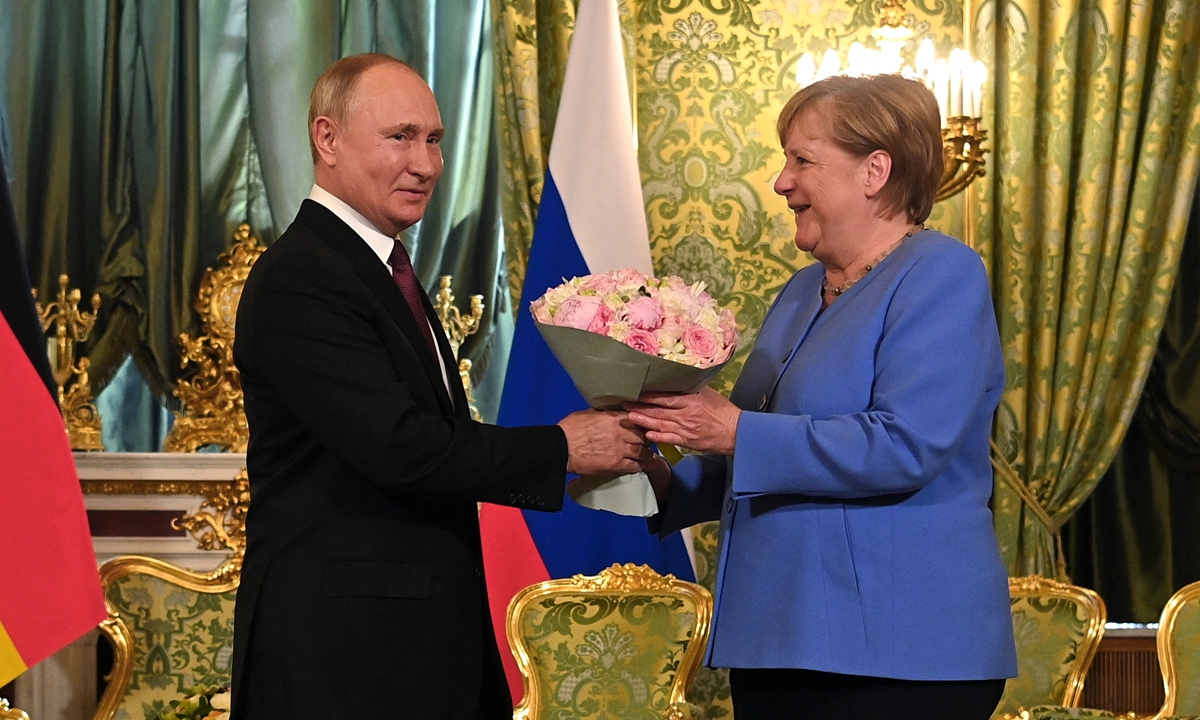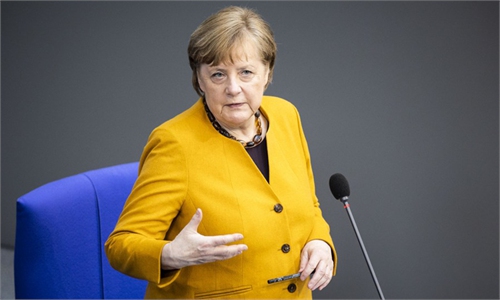
Russian President Vladimir Putin (left) welcomes German Chancellor Angela Merkel during their meeting at the Kremlin in Moscow, on Friday. Photo: AFP
German Chancellor Angela Merkel started her final official visit to Russia on Friday. Over the past few years, Germany-Russia relationship under the Merkel administration has become a rare bright spot in the context of the conflict between the West and Russia. Although Merkel may try to summarize and consolidate her diplomatic legacy toward Russia during her trip, the Germany-Russia relations and EU-Russia relations will still face many changes in the post-Merkel era.
First, the idea of using "dual-track approach" to lead EU-Russia relations is facing obstacles. Currently, human rights and political security have become an important basis for the continuous increase of EU sanctions against Russia, such as the Navalny issue and the Ukraine crisis. This has led to a freezing point in EU-Russian relations. During this process, some politicians such as Merkel have persisted to promote political dialogue with Moscow. This has effectively restricted Moscow's conflicts between the EU and NATO.
Germany has insisted on sanctions against Russia at the EU level. At the same time, it has strengthened coordination with Moscow through bilateral dialogues and high-level exchanges. Berlin has sought to resolve multilateral conflicts through bilateral dialogues, looking for the broadest common ground with Russia through third-party issues. It has even shaped a "dual-track approach" between the EU and Russia.
In June, the European Commission and the High Representative of the Union for Foreign Affairs and Security Policy presented a Joint Communication on the EU's relations with Russia. It stated, "The EU will simultaneously push back, constrain and engage with Russia." Diplomacy is an important extension of internal affairs. As Merkel is leaving office and France is about to face the 2022 presidential election, the Germany-France consensus on EU-Russian relations may be difficult to sustain.
Besides, there are still doubts in the EU's motivation and ability to promote strategic autonomy toward Russia. As a supporter of the EU's strategic autonomy, Merkel criticized Washington's sanctions against the Nord Stream 2 gas pipeline. But the Biden administration has announced waivers concerning the project. It also extended the New Strategic Arms Reduction Treaty, alleviating Europe's security anxiety. Therefore, in the later period of the Merkel administration, her relatively independent Russia policy was criticized by European elites.
In the context of reshaping transatlantic relations, the calls for punishment of Russia's so-called aggressive diplomacy may continue to rise in Germany. If the ruling Union parties are eventually forced into a coalition with the Green Party, its policy toward Russia will also be subject to the ideology and values emphasized by the latter Party. This will make it difficult to maintain diplomatic independence.
Third, it is expected that interaction between Germany and Russia based on pragmatism will continue. Looking back at the trajectory of Germany-Russia relations since the end of the Cold War, there has been practical cooperation. Russia has never stopped dialogues since the era of former German chancellor Gerhard Schröder. All this transpired despite a series of events that had some negative impacts on bilateral relations.
In addition, such cooperation has become an important support for Moscow to counter political hostility, economic decoupling and encirclement on the security level. Judging from the demands for economic recovery in the post-COVID-19 era, regardless of whether the Union parties will be in power alone or not, the next chancellor of Germany will not easily change Merkel's policies regarding Russia. This includes developing a special bilateral way to find a balance between security and economic interests, and eventually establish a European security order that includes Russia.
Finally, there are worries that there will be no greater summit diplomacy between Germany and Russia as special as the relationship between Merkel and Putin. On the one hand, the two national leaders share a common memory of East Germany. This brings them closer and helps them better understand each other's mind-set and discourse system.
On the other hand, Merkel has visited Russia 20 times since she took office. She has become Putin's most trusted key interlocutor in the West. The two heads of state have established a unique personal relationship with each other while sticking to their national interests. In some ways, they are an uncommon stabilizer of Germany-Russia relations.
In conclusion, two questions will remain after Merkel leaves office: Will the interaction between Germany and Russia continue to be a regulator of EU-Russia relations? Will Germany still play the role of a special window for dialogues between Russia and the West? The answers to these questions depend on how Merkel's successor will inherit and develop her diplomatic legacy. They will also rely on how the next German chancellor will deal with the geopolitical differences, structural contradictions, as well as the influence of domestic politics on diplomacy in both countries.
The author is a research fellow at Shanghai Institutes for International Studies. opinion@globaltimes.com.cn

